PDF chapter test TRY NOW
When we wake up in the morning, it is not always possible for us to remember what happened when we were asleep. We may remember a dream but the rest of our sleep was a kind of darkness in which nothing seems to have taken place.
Several things happen to our body while we are sleeping. As we sink deeper into sleep, our muscles relax more and more. Our heartbeat becomes slower. Our temperature and blood pressure go down. The ever-active brain also slows down so that we can’t think or act consciously. But we dream.
Explanation:
After sleeping through the night, we wake up in the morning to begin a new day. Do we remember what happened while we were asleep? We might, but not always.
Sometimes, all that we can recollect is that we have had a dream. Imagine us spending about eight hours sleeping, and all that we can remember is that we have had a dream. Did you know that a dream lasts somewhere between a few seconds and \(30\) minutes? And a person can have about \(4\) to \(7\) dreams a night.
Sometimes, all that we can recollect is that we have had a dream. Imagine us spending about eight hours sleeping, and all that we can remember is that we have had a dream. Did you know that a dream lasts somewhere between a few seconds and \(30\) minutes? And a person can have about \(4\) to \(7\) dreams a night.
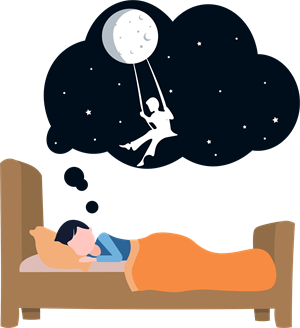
We might remember a dream from the previous night
Sometimes it is hard to recollect what our dream was about as most dreams are immediately or quickly forgotten. However, we do wake up in the morning feeling that we have had a dream. The dream is quite vivid because we must have dreamt it during the REM stage of sleep.
Though we don't feel it, so many things happen in our system while we are asleep. Our biological system repairs and rejuvenates while we are sleeping. As we sink deeper into sleep, our muscles relax. Our heartbeats become slower. Our temperature and blood pressure go down.
Though we don't feel it, so many things happen in our system while we are asleep. Our biological system repairs and rejuvenates while we are sleeping. As we sink deeper into sleep, our muscles relax. Our heartbeats become slower. Our temperature and blood pressure go down.
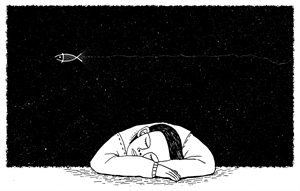
Several things happen to our body while we are sleeping
Our mind and body grow stronger, and we gain more immunity power during our sleep. The ever-active brain also slows down so that we won’t be able to think or act consciously.
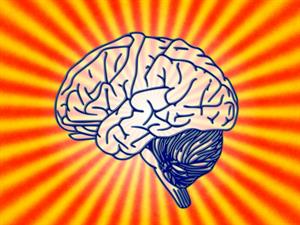
Human brain
While everything become seemingly inactive, something interesting takes place inside our head: we have dreams. We dream several dreams a night with intervals of \(1\) or \(2\) hours.
While asleep, we drift into several cycles of sleep. There would come a time when we become partly conscious and a time when we are unconscious.
Speaking of sleep, we don't sleep just like that. We go through various cycles of stages. Sleep consist of \(2\) primary phases: Non- REM and REM. (\(REM\) refers to rapid-eye-movement.)
While non-REM can be further broken down into \(3\) or \(4\) stages, REM consists of a single stage. These stages go around in cycles throughout our sleep. Let us take a look at the process.
While asleep, we drift into several cycles of sleep. There would come a time when we become partly conscious and a time when we are unconscious.
Speaking of sleep, we don't sleep just like that. We go through various cycles of stages. Sleep consist of \(2\) primary phases: Non- REM and REM. (\(REM\) refers to rapid-eye-movement.)
While non-REM can be further broken down into \(3\) or \(4\) stages, REM consists of a single stage. These stages go around in cycles throughout our sleep. Let us take a look at the process.
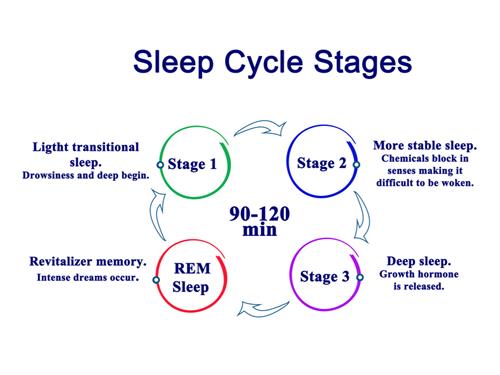
Sleep cycle stages
1. Non-REM sleep \(1\): This is the stage that follows immediately after we fall asleep. We begin to fall asleep during the stage, and it generally lasts only a few minutes. During the phase, we are almost conscious but are probably too sleepy to act. Our heartbeats and breathing start to slow down, and our muscles begin to relax.
2. Non-REM sleep \(2\): This stage is a period of light sleep. This takes place before you enter deep sleep, and it lasts for roughly \(25\) minutes. As we drift further into sleep, our body and mind would relax further.
3. Non-REM sleep \(3\): These stages are when we drift into a deep sleep. Our body performs a variety of critical health-promoting tasks in these final non-REM stages. The phase lasts for about \(20\) to \(40\) minutes.
4. REM sleep: This stage occurs about \(1\) to \(2\) hours after falling asleep. It is called REM because our eyes move rapidly during the phase. The stage lasts for about \(60\) minutes. Unlike the Non-REM stages, the breathing and heart rate increases. Our brain activity gets increased while the body becomes unmovable and would feel temporally paralysed. Also, more importantly, we do most of our dreaming during REM sleep. Since our brain paralyses our muscles during the stage, we do not act out the dreams.
Hence, a person usually progresses through the three stages of non-REM sleep before stepping into REM sleep. This sleep-cycle is repeated about \(3\) to \(4\) times each night. This is the reason why our memories from the night have blackouts in between.
Due to the cycles, we are likely to have \(3\) to \(4\) dreams every night, although we might end up remembering only one of them. We retrieve the dream the most recent REM very quickly while the dreams dreamt during the earlier cycles are mostly forgotten.
Due to the cycles, we are likely to have \(3\) to \(4\) dreams every night, although we might end up remembering only one of them. We retrieve the dream the most recent REM very quickly while the dreams dreamt during the earlier cycles are mostly forgotten.
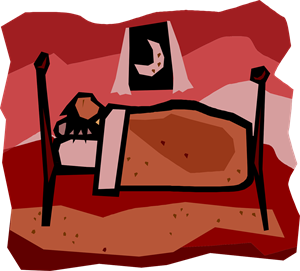
Though we have several dreams every night, we forget most of them
Meanings of difficult words:
S.No | Words | Meanings |
1 | Consciousness | The state of understanding and realising something |
2 | REM | Abbreviation for 'rapid eye movement'; quick movements of the eyes that happen at certain times while you are sleeping and dreaming |
Reference:
National Council of Educational Research and Training (2006). The Wonder Called Sleep. (pp. 25-27). Published at the Publication Division by the Secretary, National Council of Educational Research and Training, Sri Aurobindo Marg, New Delhi.
